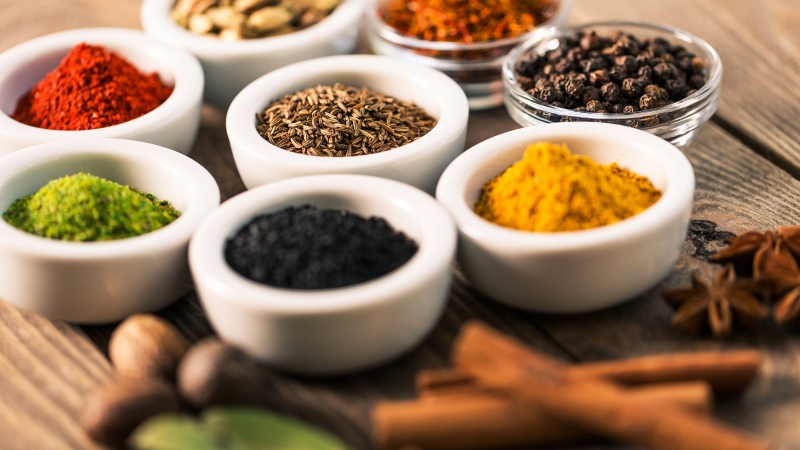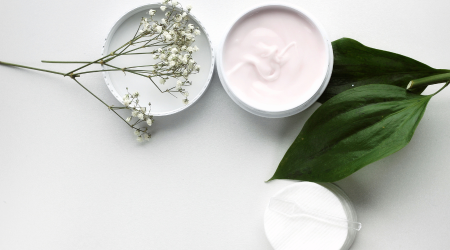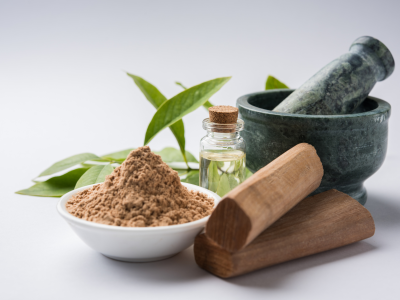
In traditional Tamil medicine, known as Siddha, various herbs and plants are used for preventive healthcare. These herbs are believed to maintain a balance of the body's elements (earth, water, fire, air, and ether) and prevent disease through their therapeutic properties. Here are some commonly used herbs in Tamil tradition for prevention:
1. Thulasi (Holy Basil) - Ocimum sanctum
- Benefits: Thulasi is considered a sacred herb in Tamil culture and is used to strengthen the immune system, combat stress, and prevent respiratory infections. It is known for its anti-inflammatory, antimicrobial, and antioxidant properties.
- Uses: Consumed in teas, powders, or as fresh leaves.
2. Amla (Indian Gooseberry) - Phyllanthus emblica
- Benefits: Rich in vitamin C and antioxidants, Amla is used to boost immunity, improve digestion, and prevent heart disease. It is also considered beneficial for skin health and longevity.
- Uses: Can be eaten raw, in powdered form, or as a juice.
3. Neem - Azadirachta indica
- Benefits: Known for its anti-bacterial, anti-viral, and anti-fungal properties, Neem is often used to purify the blood, prevent skin conditions, and support liver function.
- Uses: Neem leaves or oil are used topically for skin health or consumed in small quantities for internal cleansing.
4. Karuveppilai (Curry Leaves) - Murraya koenigii
- Benefits: Curry leaves are rich in antioxidants and nutrients like vitamin A, B, C, and iron. They are used to regulate blood sugar levels, support digestive health, and prevent hair loss.
- Uses: Added to curries, chutneys, or consumed as a paste with other herbs.
5. Moringa (Drumstick Leaves) - Moringa oleifera
- Benefits: Moringa is rich in vitamins, minerals, and antioxidants. It is known to prevent malnutrition, regulate blood pressure, and support liver and kidney health.
- Uses: The leaves can be used in soups, teas, or powdered and added to smoothies.
6. Pudina (Mint) - Mentha piperita
- Benefits: Mint is widely used for its cooling properties and digestive benefits. It helps relieve nausea, indigestion, and headaches, and has antimicrobial and anti-inflammatory effects.
- Uses: Can be used in teas, chutneys, or fresh leaves in cooking.
7. Kanchanara - Bauhinia variegata
- Benefits: Kanchanara is used to balance thyroid function, purify the blood, and strengthen the immune system. It is also considered helpful in weight management and detoxification.
- Uses: Typically taken in powdered form or as part of a herbal formulation.
8. Ginger - Zingiber officinale
- Benefits: Ginger is widely used for its digestive, anti-inflammatory, and immunity-boosting properties. It helps prevent nausea, improves circulation, and reduces inflammation.
- Uses: Can be consumed as a tea, in food, or as a paste for topical use.
9. Sida Cordifolia (Bala)
- Benefits: Used to increase vitality, improve immunity, and prevent respiratory conditions. It also has properties that help manage pain and inflammation.
- Uses: Used in powder or decoction form.
10. Ashwagandha (Withania somnifera)
- Benefits: Known as a powerful adaptogen, Ashwagandha is used to reduce stress, increase energy, improve mental clarity, and boost immunity.
- Uses: Often taken in powdered form, mixed with milk or honey.
11. Manjal (Turmeric) - Curcuma longa
- Benefits: Turmeric contains curcumin, which has potent anti-inflammatory, antioxidant, and antimicrobial properties. It is commonly used to prevent infections, improve liver health, and reduce inflammation.
- Uses: Consumed in food, as a drink (turmeric milk), or in topical applications.
12. Shatavari - Asparagus racemosus
- Benefits: Shatavari is considered a rejuvenating herb for the immune system and digestive tract. It is particularly helpful for women’s health, balancing hormones, and preventing reproductive issues.
- Uses: Taken as powder or in herbal formulations.
13. Triphala (Three Fruits)
- Ingredients: Amla, Haritaki (Terminalia chebula), and Bibhitaki (Terminalia bellirica)
- Benefits: Triphala is a powerful detoxifier and immune booster. It aids digestion, supports weight loss, and helps in maintaining skin health.
- Uses: Taken as a powder with warm water before bedtime.
14. Vallarai (Centella Asiatica)
- Benefits: Vallarai, also known as Brahmi, is used for its cognitive-enhancing effects. It is believed to help with mental clarity, reduce stress, and improve memory.
- Uses: Consumed as a paste, in soups, or in teas.
15. Soursop Leaves - Annona muricata
- Benefits: Soursop leaves are used for their detoxifying properties and to support immune function. They are also believed to have anti-inflammatory and anticancer effects.
- Uses: The leaves are boiled to make a tea or used in a tincture.
These herbs are an essential part of the Tamil tradition of preventive medicine. They are often used in combination with dietary modifications, physical activities, and lifestyle changes to maintain optimal health. However, it's important to consult with a trained healthcare provider before using any herbal remedies, especially if you are taking other medications or have specific health concerns.

















Leave a comment